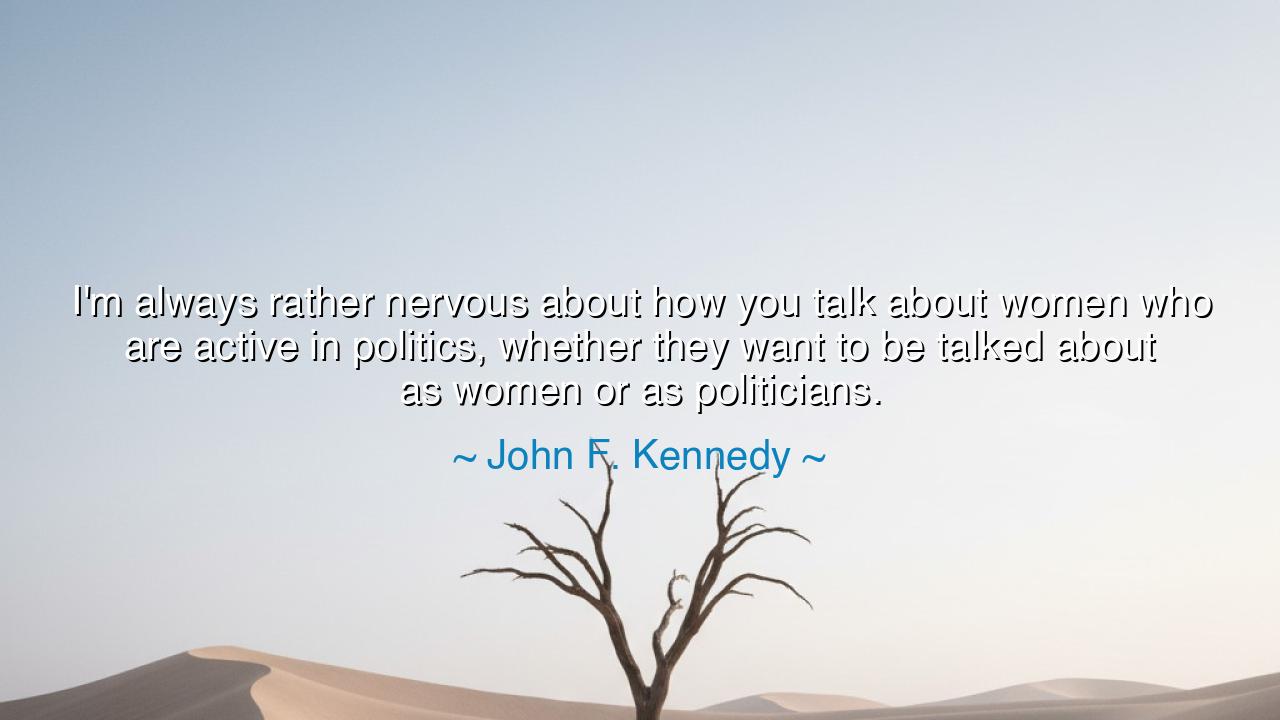
I'm always rather nervous about how you talk about women who are
I'm always rather nervous about how you talk about women who are active in politics, whether they want to be talked about as women or as politicians.






The words of John F. Kennedy — “I’m always rather nervous about how you talk about women who are active in politics, whether they want to be talked about as women or as politicians” — reveal the tension of an age when ancient boundaries were being crossed. In them we hear both uncertainty and awakening, for Kennedy lived in a time when women were rising to claim their rightful place in the councils of power, yet society had not yet learned how to honor them without binding them to old roles. His nervousness is the nervousness of a world standing at the threshold of change.
The quote speaks to the deep struggle of identity. Should a woman in politics be praised for her femininity, or recognized solely for her leadership? Kennedy’s words remind us that when labels grow too heavy, they obscure the essence of a person’s deeds. The true question is not whether a leader is man or woman, but whether they serve with wisdom, courage, and devotion. To dwell too much on gender risks reducing greatness to novelty, yet to ignore it altogether denies the barrier that was broken.
History offers us luminous examples. Consider Golda Meir, who rose to become Prime Minister of Israel, leading her nation through war and turmoil. To some, she was celebrated as a woman in power; to others, simply as a statesman of unyielding resolve. Yet her legacy proves Kennedy’s point: she could not be confined by either role. She was both — a woman and a leader — and in her fusion of identities, she illuminated a new path for those who would come after.
The nervousness Kennedy confessed was, perhaps, humility before a new reality. For centuries, politics had been shaped almost entirely by men, and the language of power was written in masculine tones. With women stepping into this arena, society struggled to find words that did not diminish. Kennedy, in his honesty, showed the discomfort of one who recognized the importance of the moment but had yet to grasp its full meaning.
Let future generations remember this lesson: that the measure of a leader is not the garments they wear, nor the body they inhabit, but the vision they bring and the justice they uphold. Women in politics are not to be bound by labels, but honored for their deeds. In them we see not only the breaking of chains but the widening of the path of human destiny. And so, Kennedy’s words remain a testimony to the turning of an age — an age when nervousness began to yield to acceptance, and acceptance to equality.






AAdministratorAdministrator
Welcome, honored guests. Please leave a comment, we will respond soon